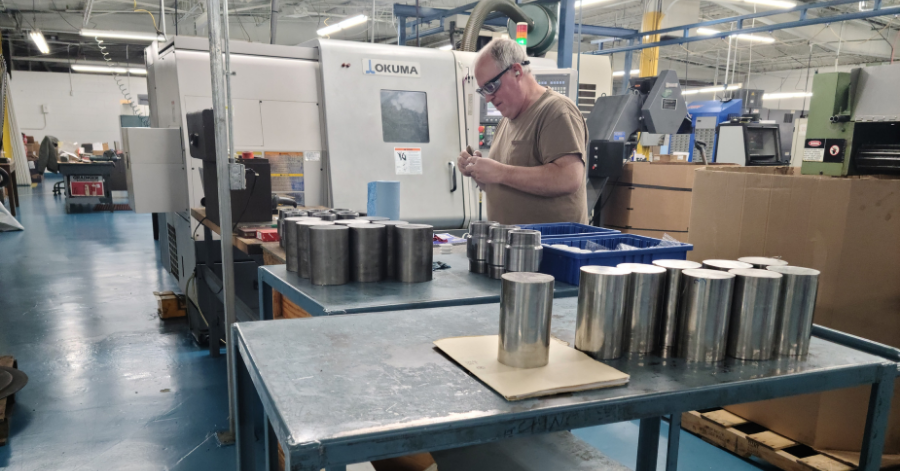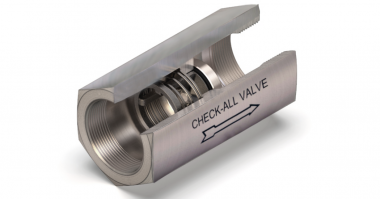When a customer has a problem to solve and needs a check valve, there are a few questions that must be asked. First, how do you want to connect the valve to your system? Is it a standard connection or a custom connection? Secondly, it’s important to know the type of media being moved so that the most appropriate material that is best suited for that media can be selected.
Finally, it’s important to know the process, the temperatures, the pressures, and the flows. All this information helps to determine which spring settings and orientations are needed so the valve will work appropriately for the application. And of course, the corrosiveness of the media helps to determine the type of material that should be used.
With this information, Check-All Valve can offer suggestions about the best suited materials for the specific application. Here are some of the most common check valve materials and their advantages.
- 316 Stainless Steel—The most popular material for check valves based on volume, stainless steel is a corrosion-resistant material, so it stays fairly rust free in applications like water, moist air, and steam. It is a relatively low-cost material in relation to its corrosion-resistant properties.
- Carbon Steel – Carbon Steel is a lower cost material that is easier to machine. Overall, expenses can be reduced by using carbon steel, however, it doesn’t have the same corrosion-resistant properties as stainless steel. If the application is in a dry environment, such as dry gas or a hydraulic liquid that doesn’t have water in it, then carbon steel is effective and there is no need to pay extra for stainless.
- Brass – In many applications, brass falls somewhere between carbon and stainless steel when it comes to corrosion resistance and price. Brass has some additional corrosion-resistant properties over carbon steel and it is easier to machine than stainless steel. Brass is used often in water and drinking water applications.
- Monel – Monel is a group of nickel alloys and considered a super alloy. Its biggest advantage its really high corrosion resistance. Monel is specifically known to be effective in saline, salt, or seawater environments. Each super alloy has different chemical resistant properties. Some do well in one environment where others may do well in a different environment.
- Alloy 20 – Alloy 20 is an austenitic alloy that many consider to be a hybrid between stainless and other super alloys. It’s typically not as expensive as a many super alloys, but it’s more highly corrosion resistant than a traditional stainless steel in certain applications.
- Alloy c-276 – Alloy c-276 is a solid solution strengthened nickel-molybdenum-chromium alloy with a small amount of tungsten. It exhibits excellent corrosion resistance in a variety of harsh environments and media. Like other nickel alloys, it is ductile, easily formed and welded. It is used in most industrial settings where aggressive chemical environments are present and other alloys have failed.
- Titanium – Titanium is an alloy that is used in very high temperatures.
- Inconel – Inconel is an austenitic nickel-chromium-based super alloy. It is an oxidation corrosion-resistant material well suited for extreme environments subjected to pressure and heat. This can often be used when customers want something similar to stainless.
Many considerations must go into the equation when selecting the right material. For example, a swimming pool may be built with stainless steel piping and components (valves, elbows, fittings, etc.). But depending the different chemicals and cleaning solutions being used, these solutions can eat away at the stainless quickly. Therefore, Monel is often used in those applications.
 Not only should the body material be considered, but also the seat material. Some valves have metal-to-metal seats and may have an allowable slight leakage rate—and in some applications this is ok. However, if a bubble-tight seal is required, in which a tighter seal is desired, then soft elastomers seat would be desired.
Not only should the body material be considered, but also the seat material. Some valves have metal-to-metal seats and may have an allowable slight leakage rate—and in some applications this is ok. However, if a bubble-tight seal is required, in which a tighter seal is desired, then soft elastomers seat would be desired.
Buna-n is a material that seals well, but if it sees sunlight it can break down quickly. EPDM seals well, but if it’s in an oil application the hydrocarbons tend to make the EPDM swell. Often, Viton™ is selected for steam applications. However, there are many types of Viton™ . While certain varieties may work in steam the most common types are not suited for these applications. Alfas® is a great selection for steam applications and offers good corrosion resistance. If you have really hot steam you may need something like Kalrez®, which also comes in several different types and is extremely corrosion resistant.
Material selection is important, so be sure to consult with your Check-All Valve expert to choose the most appropriate material for your application.





Comments